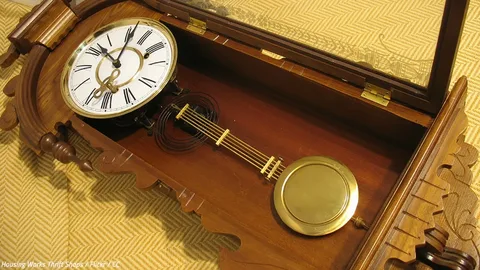A grandfather clock is more than just a timepiece—it’s a legacy. Whether it’s been passed down through generations or purchased for its charm, keeping it in good working order is essential. One of the most common issues that can affect its performance is an off-balance pendulum.
If your clock is chiming irregularly, stopping unexpectedly, or simply not keeping time, the pendulum may be the culprit. Here’s how to spot the signs and what to do next.
Understanding How the Pendulum Regulates Time
The pendulum is the heartbeat of your grandfather clock. It swings back and forth, regulating the movement of gears that control the hands and chimes. When it’s balanced and functioning properly, your clock ticks steadily and keeps accurate time.
However, if the pendulum is off-balance—even slightly—it can throw off the entire mechanism. This imbalance can cause the clock to run fast, slow, or stop altogether. Understanding this basic function helps you recognize when something’s not quite right.
Listening for Irregular Ticking or Silence
One of the first signs of a pendulum problem is irregular ticking. A healthy grandfather clock produces a steady, rhythmic tick-tock sound. If you notice that the ticking is uneven, erratic, or has stopped completely, the pendulum may be misaligned.
Silence is also a red flag. If your clock has stopped ticking but the weights are still in position, the pendulum might not be swinging freely. These sounds—or lack thereof—are often the earliest clues that something needs attention.
Watching for Inconsistent Timekeeping
If your grandfather clock is suddenly running too fast or too slow, don’t ignore it. A pendulum that’s off-balance can disrupt the clock’s timing. You might find yourself adjusting the hands more often than usual, or noticing that the chimes are out of sync with the hour.
This isn’t just a minor inconvenience—it’s a sign that the pendulum’s swing is no longer calibrated correctly. Over time, this can lead to more serious mechanical issues if left unchecked.
Checking the Pendulum’s Swing Pattern
Take a moment to observe the pendulum while the clock is running. A properly balanced pendulum should swing evenly from side to side. If it’s favoring one side, hesitating mid-swing, or wobbling, it’s likely off-balance.
Sometimes the issue is caused by a bent suspension spring, a misaligned pendulum bob, or even dust buildup. These subtle changes in movement can be hard to spot unless you’re looking closely, but they’re important indicators of a deeper issue.
Inspecting for Physical Damage or Loose Components
Physical damage can also affect pendulum balance. Look for signs of wear on the pendulum rod, bob, or suspension spring. If any parts appear bent, loose, or corroded, they could be interfering with the pendulum’s motion.
Even a small dent or misalignment can throw off the swing. In older clocks, components may loosen over time due to age or environmental changes. If you’ve recently moved the clock or bumped it accidentally, that could also cause the pendulum to shift out of balance.
Consulting Repair Professionals
If you’ve noticed any of these signs and aren’t sure how to fix them, it’s time to call in the experts. Grandfather clocks are intricate machines, and attempting repairs without proper knowledge can do more harm than good. Grandfather clock repair professionals like The Clock Doctor specialize in diagnosing and correcting pendulum issues.
Experts can recalibrate the swing, replace worn parts, and ensure your clock is running smoothly again. Professional help is especially important for antique clocks, where preserving original components is key.
Preventing Future Pendulum Issues
Once your clock is back in working order, regular maintenance can help prevent future problems. Keep the clock level and stable, as uneven surfaces can affect pendulum movement. Avoid placing it near vents, windows, or areas with fluctuating temperatures.
Dust the pendulum gently and check for signs of wear every few months. If your clock has been idle for a long time, restart it carefully and monitor its performance. A little attention goes a long way in keeping your grandfather clock ticking for years to come.
Conclusion
Your grandfather clock deserves care and attention, especially when its pendulum starts acting up. By listening, observing, and knowing when to call a professional, you can keep your clock in top shape. Whether it’s a family heirloom or a decorative centerpiece, restoring its balance brings back its charm—and its steady rhythm.


